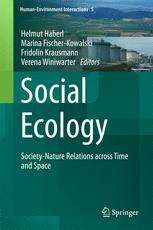

Most ebook files are in PDF format, so you can easily read them using various software such as Foxit Reader or directly on the Google Chrome browser.
Some ebook files are released by publishers in other formats such as .awz, .mobi, .epub, .fb2, etc. You may need to install specific software to read these formats on mobile/PC, such as Calibre.
Please read the tutorial at this link: https://ebookbell.com/faq
We offer FREE conversion to the popular formats you request; however, this may take some time. Therefore, right after payment, please email us, and we will try to provide the service as quickly as possible.
For some exceptional file formats or broken links (if any), please refrain from opening any disputes. Instead, email us first, and we will try to assist within a maximum of 6 hours.
EbookBell Team

4.7
76 reviewsThis book presents the current state of the art in Social Ecology as practiced by the Vienna School of Social Ecology, globally one of the main research groups in this field. As a significant contribution to the growing literature on interdisciplinary sustainability studies, the book introduces the purpose and nature of Social Ecology and then places the “Vienna School” within the broader context of socioecological and other interdisciplinary environmental approaches. The conceptual and methodological foundations of Social Ecology are discussed in detail, allowing the reader to obtain a broad overview of current socioecological thinking. Issues covered include socio-metabolic transitions, socioecological approaches to land use, the relation between actor-centered and system approaches, a socioecological theory of labor and the importance of legacies, as conceived in Environmental History and in Long-Term Socio-Ecological Research. To underpin this overview empirically, the strengths of socioecological research are elucidated in cases of cutting-edge research, introducing a variety of themes the Vienna School has been tackling empirically over the past years. Given how the field is presented – reflecting research carried out on different scales, reaching from local to global as well as from past to present and future – and due to the way the book is structured, it is suitable for classroom use, as a primer, and also as an overview of how Social Ecology evolved, right up to its current research frontiers.